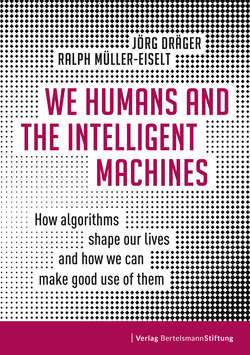Читать книгу We Humans and the Intelligent Machines - Jörg Dräger - Страница 27
На сайте Литреса книга снята с продажи.
No blind trust
ОглавлениеAs these six examples have shown: Algorithms can be deficient and produce unwanted results, data can reflect and even reinforce socially undesirable discrimination, people can program software to achieve the wrong objectives or they can allow dangerous monopolies to take shape. Thus, blind faith is inappropriate. Algorithms are merely tools for completing specific tasks, not truly intelligent decision makers. They can even draw wrong conclusions while fulfilling their mission perfectly. After all, they do not understand when their goals are inappropriate, when they are not subject to the necessary corrections or when they deprive entire groups of the opportunity to participate in society. They can do considerable harm with machine-like precision. When algorithms are mistaken, we cannot let them remain in their error – to return to the adage by Saint Jerome quoted in the last chapter. People are responsible for any wrongdoing of this sort. They determine which objectives algorithms pursue. They determine which criteria are used to reach those objectives. They determine whether and how corrections are carried out.
And just like Carol from the Little Britain sketch, they hide behind algorithms when they do not want to or cannot talk about the software’s appropriateness. For example, the head of Human Resources at Xerox Services reported that algorithms are helping her department reduce the high turnover at the company’s call center. The software used to parse applications predicts a potential employee’s length of stay at the company (see Chapter 12). When asked what criteria the program used, the HR director replied, “I don’t know why this works. I just know it works.”11 Such answers forestall any debate about which candidates are rejected and why and whether there might be a systematic bias.
A second example is provided by Germany’s Federal Ministry of the Interior. It used facial recognition software in a pilot project at the Südkreuz train station in Berlin to search for criminals and terrorists. Its official statement for the project reads: “We achieved a 70-percent and above recognition rate of the test subjects – a very good figure.”12 This means that the software correctly recognized seven out of ten wanted persons. But that is not the entire story. The ministry did initially not disclose the number of innocent passers-by falsely identified by the system. Its complete interim report has been kept under lock and key.13
Both users, Xerox Services and the Ministry of the Interior, are thus making it more difficult to have a public discussion on the use of algorithms, one that is sorely needed. Both the question of possible discrimination in selecting employees and the right balance between surveillance and security needs are sensitive issues in a free society. Citizens can legitimately demand that users of algorithms assume responsibility and not hide behind a machine. More facts and figures need to be on the table for a real debate to take place. After all, only those who understand how their systems work can detect and eliminate errors and biases.
Not only do we need effective algorithms, algorithms need us, too. We must therefore act in a way that is both competent and ethically responsible. In addition to the technical challenge, there are moral and legal aspects which must be addressed. Where seemingly intelligent machines judge people and errors quickly have a resounding impact, people must be able to discuss and define the goals machines are used for and comprehend their basic functioning at all times. We have a social responsibility to ensure that the software that governs our lives functions properly, that it is corrected when necessary, and that it receives the feedback it needs to improve. In cases where this is not possible and society’s key principles, including social solidarity, become endangered, we must not shrink from prohibiting the use of algorithms. In a democracy, artificially dumbing down artificial intelligence is a legitimate response (see Chapters 14 and 15).
